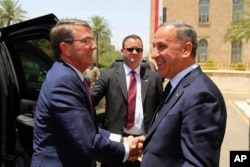A key Islamic State terror group commander known for his brutally effective tactics and for surviving numerous attempts to kill him has died in battle, according to an IS-linked media organization.
The Aamaq News Agency said Wednesday that Abu Omar al-Shishani, also known as “Omar the Chechen,” was killed in the town of Shirqat while trying to “halt the military campaign” against the self-declared caliphate’s Iraqi capital of Mosul.
U.S. and coalition forces had targeted Shishani numerous times, including in an airstrike on March 4 in al-Shaddadi, Syria.
“It's our assessment that that was a successful strike and that he was killed in that strike,” Pentagon spokesman Peter Cook said at the time.
Until now, IS repeatedly denied claims Shishani had been killed.
Pentagon officials said they were aware of the Aamaq report of Shishani’s death in Shirqat, but that they could neither confirm nor deny it.
Previous claims
“He's been reported dead nine times now, but this might be the one,” said Patrick Skinner, a former intelligence officer now with the Soufan Group, a New York organization that provides strategic security intelligence services to governments and multinational organizations.
“Shirqat is key to Mosul, and Shishani is a tactical commander,” Skinner said. “It would make sense Shishani would be where the fighting was.”
Shirqat is about 100 kilometers south of Mosul and is within about 35 kilometers of Qayyarah. Iraqi security forces, backed by U.S. air power, began advancing on the area late last month and just days ago seized the key Qayyarah West airbase.
During a visit to Baghdad on Monday, U.S. Defense Secretary Ash Carter said he was sending an additional 560 troops to Iraq, in part to help turn the base into a logistics and air hub for the assault on Mosul.
Pentagon officials have described Shishani as IS’s “minister of war,” a battle-hardened commander with ties to IS leader Abu Bakr al-Baghdadi.
Shishani pledged allegiance to IS in mid-2013, bringing with him hundreds of Russian-speaking fighters. He quickly rose to the rank of IS northern commander and gained a seat on the terror group’s Shura council, responsible for helping to implement IS’s religious doctrines.
Georgian national
The Syrian-based Georgian national previously served in an intelligence unit with the Georgian army, where he was trained in U.S. counterterrorism and counterinsurgency tactics.
Shishani is also credited as being one of the driving forces behind the militant group's rapid gains in Iraq’s Anbar province in 2014.
“It was tactically brilliant,” said Daveed Gartenstein-Ross, a senior fellow with the Foundation for the Defense of Democracies, a Washington group that conducts research on global terrorism.
“[Shishani] didn’t use that many men to capture territory,” Gartenstein-Ross said. “He used a relatively light force to capture a significant amount of ground.”
Defense officials have said removing Shishani from the battlefield would strike a blow to the group's ability to coordinate its defense of key cities, such as Mosul and the group’s Syrian capital of Raqqa.
They said it would also damage the ability of IS to recruit, and possibly keep, foreign fighters from Chechnya and the Caucasus regions.
The U.S. State Department had announced a reward of up to $5 million for information leading to Shishani’s arrest or death.


